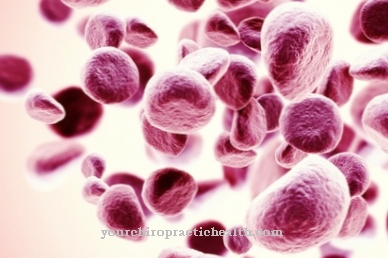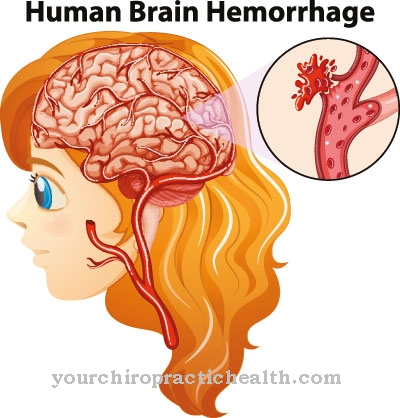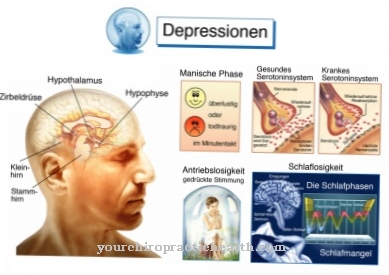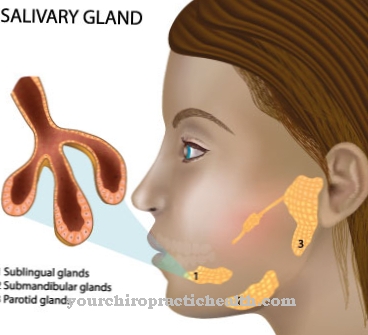Crohn's disease is a chronic bowel inflammation in the area of the gastrointestinal tract or digestive tract. This leads to typical relapses of discomfort and symptoms such as diarrhea, painful stomach cramps and severe weight loss. However, these symptoms are initially unspecific, so Crohn's disease is not always diagnosed first. Therefore, if chronic bowel inflammation is suspected, the doctor should always perform a colonoscopy, X-ray examination, laboratory tests, and ultrasound during diagnosis and treatment.
What is Crohn's Disease?
.jpg)
Of the Crohn's disease (chronic bowel inflammation) In addition to ulcerative colitis, it is one of the chronic inflammatory bowel diseases that often occurs in flare-ups. The frequency peak is between the ages of 16 and 35. Older people over 60 years of age can experience a so-called age crohn. There is a familial accumulation, the overall incidence of the disease is increasing.
The symptoms are not infrequently unspecific (cramps, nausea, weight loss), and courses without the diarrhea as a guide are also possible. It is characterized by the formation of granulomas in the intestinal wall. In contrast to ulcerative colitis, Crohn's disease can occur throughout the gastrointestinal tract, from the oral cavity to the rectum. Often there is a discontinuous infestation, i.e. affected sections are interrupted by healthy intestines.
However, the last segment of the small intestine, the terminal ileum, is typically affected. Symptoms outside of the gastrointestinal tract are common, usually joint pain and inflammation, painful skin changes or eye symptoms. The diagnosis is made via a colonoscopy with the removal of tissue samples.
causes
About the causes of Crohn's disease (chronic bowel inflammation) there is much speculation, none of the theses has been proven so far. Only smoking has been identified as a risk factor. Crohn's disease is currently classified as an autoimmune disease. This classification is by no means certain; it is based solely on the good response to immunosuppressive therapy. It is also assumed that the affected person has a barrier disorder of the intestinal wall, so that bacteria can penetrate unhindered and provoke a sometimes excessive defense.
A genetic component is also discussed because of the familial accumulation. It is unclear whether excessive hygiene, nutritional conditions or infections with mycobacteria play a decisive role. For a long time, Crohn's disease was thought to be a psychosomatic illness. This has now been refuted as the sole cause, although a psychosomatic influence can be assumed. The severity of the disease and the frequency of relapses are significantly increased in stressful times.
Symptoms, ailments & signs
You can play the film in the following browsers: Internet Explorer, Firefox, Safari and Chrome.
Colonoscopy of the large intestine in Crohn's disease © Juan Gärtner - Fotolia.com
Such food allergies or food intolerances are more common in patients with inflammatory bowel diseases such as Crohn's disease. As a result of the numerous diarrhea, further symptoms can develop, which can be traced back to the high protein and fluid loss. Fatigue and exhaustion are common.
There is also a loss of appetite, which in turn can lead to severe weight loss. The malabsorption of nutrients in the intestine can lead to various deficiencies. A vitamin B deficiency, which can be the cause of anemia, is typical. During an episode there is usually a general feeling of illness.
In addition to the symptoms of anemia, fever and an increase in white blood cells can occur. Other organs can also be affected. Symptoms of hepatitis, kidney stones, joint pain, bone loss, eye infections or painful skin diseases are observed in around 40 percent of patients with Crohn's disease. The high level of disease activity often causes psychological problems, which manifest themselves, among other things, in depression.
Complications
Since Crohn's disease permanently damages the tissue of the digestive tract through inflammation, fistulas occur. Depending on how they run and whether they cause an unintended mix of substances in the body, they must be surgically removed. The same applies to developing ulcers.
In the worst case, these can degenerate and lead to tumor formation. The risk of tumor diseases in the digestive tract is increased. An intestinal obstruction occurs at least once in up to 30 percent of those affected and represents an acute emergency. There are also severe narrowing of individual sections of the intestine. Both involve operations.
Inflammatory abscesses in the various parts of the digestive tract - especially the intestines - also occur. They can also cause severe inflammation and, if mechanically opened, lead to symptoms of poisoning. In addition, the impaired absorption capacity of the intestine, in combination with the occurrence of diarrhea, often leads to deficiency symptoms and metabolic imbalances.
In addition to general exhaustion, this also leads to problems in the bone tissue (osteoporosis; also promoted by cortisone therapy of the disease) and to further tissue weaknesses. Urinary stones are also common. In addition, a protein deficiency can set in, which is unfavorable for the entire cell maintenance of the body.
Because people with Crohn's disease should avoid certain foods, there is often an undersupply of certain nutrients, which must be compensated for with medication or by giving food supplements.
When should you go to the doctor?
_2.jpg)
Diarrhea, pain in the stomach or intestines, and unwanted severe weight loss must be examined by a doctor. Before taking any pain reliever medication, it is generally advisable to consult a doctor because of the possible risks and side effects. The symptoms are characteristic of the disease.
Between the phases, the person concerned experiences a period of symptom-free time, which for some patients can last several months or years. However, a doctor's visit is necessary so that extensive medical tests can clarify the cause and thus make a diagnosis. An increase in existing irregularities during an attack should be presented to a doctor as soon as possible, as they contribute to a severe impairment of the quality of life.
In the event of exhaustion, tiredness, loss of appetite and internal weakness, a doctor should be visited.If there are intolerance reactions of the organism when eating or if inflammation occurs, a doctor's visit is advisable. Joint pain, eye discomfort, kidney stones or hepatitis may be the cause of Crohn's disease. Therefore, a doctor is required to order further examinations. Irritation, inner restlessness and psychological abnormalities are also signs of an existing health disorder. A visit to the doctor is recommended as soon as the symptoms persist for several days or weeks.
Treatment & Therapy
In the acute episode at Crohn's disease the intestines are relieved by parenteral nutrition. In terms of medicine, the use of cortisone is paramount.
This can be used either systemically or, in the case of deep involvement, as an enema or rectal foam. Symptom relief is the rule, and symptoms of the disease can often even be reduced. Salazosulfapyridine and mesalazine can also be used, but their effectiveness is relatively low.
Antibiotic therapy can be useful in the event of complications. Antibodies against TNF-alpha (tumor necrosis factor) belong to a very young group of active substances, which to date have shown a promising effect even in severe cases.
Immunosuppressants and TNF-alpha blockers are used for remission therapy (i.e. to prevent new attacks). Often, a maintenance dose of cortisone cannot be avoided.
Surgical therapy should be carried out as sparingly as possible and, as a rule, be limited to the treatment of complications. Indications are e.g. Narrowing of the intestine (stenosis) up to intestinal obstruction, breakthrough through the intestinal wall (perforation), tunnel formation between intestinal loops, to other organs or to the skin surface (fistulas), inflammatory melts (conglomerate tumor) and abscesses.
A psychological stress management and body awareness therapy is also recommended.
Outlook & forecast
Crohn's disease has a very individual prognosis, but it is always a lifelong condition for everyone affected. With increasing age, it is the case for many people that symptoms and relapses become less frequent. About a third of those affected experience Crohn's disease as an intermittent disease with no symptoms in between. This freedom from symptoms can sometimes last for months. In around a fifth of all those affected, however, chronic bowel inflammation manifests itself as a permanent ailment without phases of improvement.
It has been shown that approximately half of people with Crohn's disease have at least one major flare-up within a year. Within two years it is up to 70 percent. Diet and lifestyle are important factors in relation to a possible flare-up. Cigarettes and alcohol usually make inflammation worse. A particular diet is currently not recommended. Deficiency symptoms can occur due to the weak intestine and should be compensated for a better prognosis.
Necessary operations worsen the quality of life for some people. Likewise, around a third of sufferers develop inflammation in other parts of the body, such as the eyes or bones.
Lifelong therapy, as well as any stress on the body from operations and the frequent inflammation, reduce the life expectancy of Crohn's disease patients slightly.
prevention
_3.jpg)
Since until today no cause for that Crohn's disease specific prevention is not possible. Only risk factors can be avoided (especially smoking).
Complications can be avoided or delayed by early diagnosis and subsequent adequate therapy. The prevention of deficiency symptoms as a result of impaired absorption from the intestine (e.g. deficiency in fat-soluble vitamins, osteoporosis due to calcium deficiency, massive weight loss due to fat loss via the intestine) is one of the building blocks in the therapy of Crohn's disease.
Aftercare
For Crohn's disease, follow-up exams and treatments are extremely important parts of the disease process. They essentially help to deal with the disease and to live with it. Due to the chronic course, the disease can spread and affect other regions of the gastrointestinal tract. Follow-up examinations can localize inflammation foci at an early stage.
In addition, the follow-up examinations also serve to prevent colon cancer. Through an endoscopy of the intestine, changes and diseases in the large intestine and at the end of the small intestine can be detected. In this way, the attending physician always keeps an eye on the patient's risk of developing colon cancer. Patients with Chron's disease are usually included in appropriate therapy programs.
This includes ongoing advice on nutrition and a healthy lifestyle. A balanced, healthy and individually tailored diet can be of lasting help. Sports activities and dealing with stressful situations also play a decisive role for patients with Chron's disease in coping with everyday life.
The aim of the follow-up treatment is to achieve a long-lasting remission phase in which the patient is largely doing well. Talking to a psychotherapist about the illness is also helpful. Exchanging ideas with other Crohn's disease patients as part of self-help would also be beneficial.
You can do that yourself
Adhering to the treatment plan prescribed by the doctor is extremely important in the treatment of Crohn's disease. In order to avoid complications, the dosage of the medication must not be changed without authorization, even if the symptoms improve.
Stress can worsen the symptoms, so regular breaks should be included in everyday life. Learning relaxation techniques and exercising while taking your own performance into account can also contribute to an increase in wellbeing. Smoking has a negative effect on the course of the disease and should be avoided.
Eating habits play a major role: It is advisable to keep a food diary in order to track down incompatible foods - these must be consistently removed from the menu. Occasionally, changing the method of preparation helps improve digestibility: raw vegetables, for example, cause far more symptoms than cooked vegetables. Particular attention must be paid to adequate nutrient intake, as these are difficult to absorb from food due to chronic intestinal inflammation. Some vitamins and minerals, including calcium and vitamin D, which are important for bone health, may have to be taken in an appropriate dietary supplement after consulting your doctor.
Detailed information about the illness and the associated restrictions and possibilities can help to accept the illness more easily - this is often helped by exchanging ideas in a self-help group.




.jpg)







.jpg)



.jpg)










.jpg)
